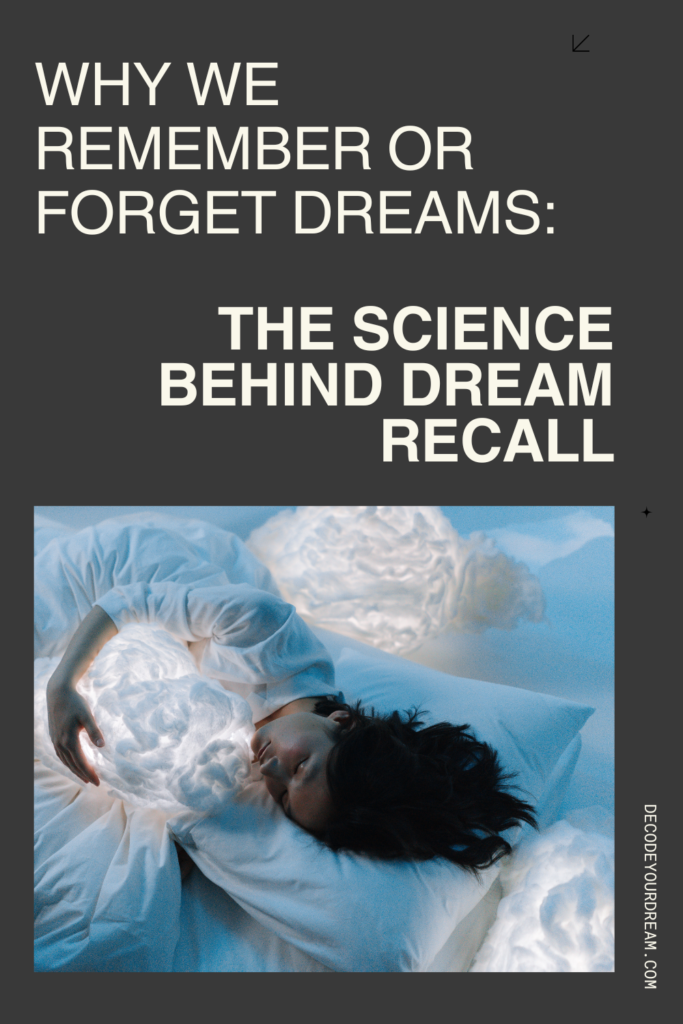You wake up in the morning with fragments of a strange story still floating in your mind. Maybe you were running through an airport. Maybe you were back in school. Maybe you were talking to someone who hasn’t been in your life for years. For a few seconds, it feels vivid and real. Then you brush your teeth, check your phone, and just like that, it’s gone.
Other mornings, you wake up with nothing. No images. No emotions. Just blankness.
So why do we sometimes remember our dreams in detail, and other times forget them completely? Is it random, or is there actual science behind dream recall?
There is, in fact, a fascinating neurological explanation for why we remember some dreams and lose others. And it has less to do with how “important” a dream is and more to do with how the brain works during sleep and waking.
What Happens in the Brain When We Dream
Most vivid dreams occur during REM sleep, short for rapid eye movement sleep. During this phase, the brain becomes surprisingly active. In many ways, it resembles wakefulness. Emotional centers like the amygdala are highly engaged, which explains why dreams often feel intense, dramatic, or meaningful.
At the same time, the prefrontal cortex — the part of the brain responsible for logical thinking, organization, and memory consolidation — is less active. That’s important. Because while we are creating complex dream narratives, the part of the brain that helps store memories is partially offline.
In simple terms, your brain is generating a story, but not fully saving it.
This is one major reason dreams can feel real and vivid in the moment but fade quickly after waking.
The Role of Memory Systems in Dream Recall
Memory formation depends on a structure in the brain called the hippocampus. During wakefulness, the hippocampus helps transfer short-term experiences into long-term memory storage.
During REM sleep, however, the communication between the hippocampus and other brain regions changes. Neurochemicals like norepinephrine, which play a key role in memory consolidation, are present at very low levels during REM sleep.
Without sufficient norepinephrine activity, the brain has difficulty stabilizing and storing dream content as lasting memories. That means the dream can exist in vivid detail while you’re asleep, but once you wake, there’s no solid memory trace holding it in place.
This is why dreams can disappear within seconds.
Why Some People Remember Dreams More Often
Not everyone experiences dream recall the same way. Some people remember dreams almost every morning. Others claim they never dream at all, even though we all do.
Research suggests that frequent dream recallers tend to wake up more often during the night, even briefly. These micro-awakenings create opportunities for the brain to transfer dream content into waking memory.
If you wake directly out of REM sleep, you are far more likely to remember your dream. If you move smoothly into deeper non-REM sleep and then wake later, the dream may already be lost.
Brain imaging studies also show that people who regularly remember dreams often have higher activity in the temporoparietal junction, an area linked to attention and internal thought processing. In other words, they may simply be more attuned to their inner experiences.
Why We Forget Dreams So Quickly
Dreams fade quickly because they are fragile memories.
When you wake up, your brain rapidly shifts gears. External stimuli take over. Light enters your eyes. You begin thinking about the day ahead. The brain prioritizes new incoming information over the unstable dream memory.
Without rehearsal or conscious focus, the neural pattern that held the dream dissolves.
This is similar to how you might forget a random thought you had in the shower. If you don’t anchor it, it disappears.
The difference is that dreams are even more vulnerable because they were formed in a neurochemical environment that wasn’t optimized for storage in the first place.
Emotional Intensity and Dream Recall
Emotion plays a significant role in memory retention. The more emotionally charged an experience is, the more likely you are to remember it.
The same principle applies to dreams.
If a dream evokes fear, excitement, embarrassment, or deep joy, you’re more likely to recall it. Emotional activation strengthens memory traces, even during REM sleep.
That’s why nightmares are often easier to remember than neutral dreams. The surge of emotion acts like a highlighter in the brain.
However, not all emotional dreams are remembered. If you do not wake up during or shortly after the emotional peak, the memory may still fade.
Does Stress Affect Dream Recall?
Yes, stress can influence dream recall in complex ways.
During periods of high stress, sleep patterns often become fragmented. You may wake up more frequently during the night. This increases the chance of remembering dreams.
At the same time, chronic stress can disrupt sleep quality and reduce time spent in REM sleep, which may reduce dream vividness overall.
Stress also increases cortisol levels, which can interfere with memory formation and consolidation.
So stress may make dreams feel more intense, but it does not guarantee better recall.
The Myth That We Only Dream in Black and White
Some people believe they don’t dream because they don’t remember color or detail. But the idea that certain people do not dream at all is largely a myth.
Everyone cycles through REM sleep multiple times each night. Dreaming is a normal neurological function.
If you believe you never dream, it likely means you rarely wake during REM sleep, or you do not anchor the dream into memory before it fades.
In many cases, improving sleep awareness can significantly increase dream recall.
Can You Train Yourself to Remember Dreams?
Yes, dream recall can be improved.
The key is timing and intention. When you wake up, remain still for a moment. Do not immediately check your phone. Before moving, ask yourself what you were just experiencing.
Even if you only remember a feeling or a single image, hold onto it. Repeating the fragment in your mind helps stabilize it.
Writing dreams down immediately is also effective. The act of recording reinforces memory pathways and signals to your brain that dreams matter.
Over time, your brain may respond by preserving dream content more reliably.
Why Some Dreams Feel More Real Than Others
Some dreams feel cinematic and immersive, while others feel hazy.
This often depends on sleep cycles. REM sleep becomes longer and more intense in the later part of the night. Dreams closer to morning tend to be longer and more vivid.
If you wake naturally from late REM sleep, the dream may still be fresh in short-term memory.
Earlier dreams, especially those that occur in shorter REM cycles, are less likely to be remembered.
The Relationship Between Personality and Dream Recall
Studies suggest that people who score high in openness to experience tend to remember dreams more frequently. These individuals often have rich imaginations and pay closer attention to internal mental states.
Creative individuals also tend to report higher dream recall.
This does not mean you must be artistic to remember dreams. It simply suggests that attention and curiosity toward inner experiences influence recall.
If you treat dreams as irrelevant, your brain may prioritize discarding them.
Are Forgotten Dreams Still Meaningful?
Even if you do not remember your dreams, they still serve a purpose.
Dreaming is believed to help regulate emotions, process experiences, and consolidate learning. The psychological and neurological benefits occur whether or not you consciously recall the dream.
In other words, forgetting does not mean dreaming failed.
Your brain still did the work.
Frequently Asked Questions About Dream Recall
Why do I remember some dreams and forget others?
Dream recall depends largely on whether you wake up during or shortly after REM sleep. Emotional intensity, stress levels, and attention upon waking also influence whether a dream is remembered.
Is it normal to forget dreams immediately?
Yes, it is completely normal. The brain’s chemistry during REM sleep is not optimized for memory consolidation, making dreams fragile and easily forgotten.
Why do I only remember nightmares?
Nightmares often involve strong emotional activation, which enhances memory formation. Fear and anxiety can make a dream more memorable than neutral dream content.
Can medications affect dream recall?
Certain medications, especially those that influence neurotransmitters like serotonin and norepinephrine, can affect REM sleep and dream vividness. This may increase or decrease dream recall.
Why do I suddenly remember more dreams?
Changes in stress, sleep patterns, or waking during REM sleep can increase recall. Practicing dream journaling can also significantly improve memory of dreams.
Do people who say they never dream actually dream?
Yes. Nearly everyone dreams during REM sleep. Lack of recall does not mean lack of dreaming.
How can I improve my dream recall naturally?
Waking gently, staying still upon waking, setting an intention to remember dreams, and journaling immediately can all strengthen dream recall over time.
Final Thoughts
Remembering or forgetting dreams is not random. It reflects how the brain transitions between sleep and wakefulness, how memory systems operate during REM sleep, and how much attention we give to our internal experiences.
Dreams are not stored like ordinary memories. They are delicate, shaped in a neurochemical state that favors emotion and imagination over logic and retention.
If you wake up with nothing but blankness, it does not mean you did not dream. It simply means your brain chose not to preserve the story.
And if you do remember a dream, even briefly, consider it a rare glimpse into the quiet processing happening beneath conscious awareness.
Whether remembered or forgotten, dreams are part of the mind’s nightly work — stitching together emotion, memory, and imagination while you sleep.
PIN THIS!







One Comment